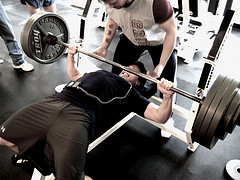My family has a long history of heart problems. My grandfather on my dads side of the family has had a heart attack, and my dad has had open heart surgery before. When I was younger, I would get a heart screening every 2 years to make sure that nothing irregular was happening to my heart. As I started to get older and get involved with weight lifting, I started to get my heart checked annually. My family is always taking all the precautions to make sure that me and my brothers don’t end up having to go through heart problems.
According to Charles Webb, lifting heavy weights causes blood pressure to rise, which puts extreme stress of the aorta, the heart’s main artery. Aortic dissection is something that people should be aware of if they are lifting heavy weights. Aortic dissection is a split in the walls of the aorta, that lets blood rush in, and can be cause death unless surgery is performed immediately. Everyone who lifts weight should be aware that if they start to feel a sharp, stabbing pain in the heart, they should either get help, or get checked out by a doctor immediately.
The increase in the blood pressure is caused by the subject holding their breath when straining their muscle to get the weight up. This contraction causes your spine to tighten up, which supports your back, causing the blood pressure to rise.
This particular study can be explained in multiple ways. There could be a direct causal relationship where lifting heavy weights causes a higher blood pressure. There could not be a reverse causal effect however, because higher blood pressure does not help you with lifting weights, it only can cause more danger. The confounding variables in this study is whether or not the subject has high cholesterol, high blood pressure, history of heart problems, old age, or anything that can affect the subject’s heart. As always, this study could be because of chance and have no reason behind it. The putative causal variable being measured is lifting heavy weights. The putative response variable being measured is higher blood pressure. The higher the blood pressure, the more the aorta is put under strain. The hypothetical mechanism in this study is the weight lifting that causes the blood pressure to rise. Overall, we can assume that the study is correlated, but we do not know if the relationship is causal or not.
If you do not have a history of high cholesterol, heart problems, or high blood pressure this shouldn’t be a problem for you. However, if you do have any of these problems, you should get your heart screened by a heart doctor at least annually. You never know when your heart could be going through too much stress. A logical person would get their heart checked, even if this study does not prove that it is a causal relationship.
Works Cited
Webb, Charles. “Does Lifting Heavy Weights Hurt Your Heart?” LIVESTRONG.COM. LIVESTRONG.COM, 28 Jan. 2015. Web. 15 Sept. 2016.




